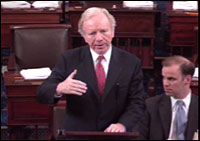“We were nervous as hell,” said Kevin Curtis, vice president of National Environmental Trust, describing the sentiment leading up to last Thursday’s Senate vote that defeated the McCain-Lieberman Climate Stewardship Act, 43 to 55. “But it’s a great start. This may seem to be a defeat now, but in the end, it’s a victory.”

Lieberman stumps for his bill.
Photo: U.S. Senate.
The victory lies in the gamesmanship surrounding the landmark bill, which was the first serious congressional attempt to rein in global warming. Three weeks ago, the bill reportedly had only 32 votes firmly in support of it; more than a dozen senators were on the fence. “Our fear was that if the bill pulled in fewer than 40 votes, we’d have screwed ourselves,” said Curtis. “But a majority of the undecided senators broke in favor of McCain-Lieberman.”
Translation: Even though the Senate didn’t pass the Climate Stewardship Act, which would cap carbon dioxide emissions from industries and create an emissions-trading system, the votes that the bill did attract sent a resounding message to the political machine. “The magic number in the current political climate is 40,” said Curtis: A bill that gets at least 40 votes has a fair chance of passing if it’s reintroduced, but a bill that gets fewer than 40 is as good as doomed for the foreseeable future.
At a time when the White House refuses to recognize global warming as scientific fact and the chair of the Senate Environment and Public Works Committee, Sen. James Inhofe (R-Okla.), refers to climate change as “the greatest hoax ever perpetrated on the American people,” it is something of a shock that the McCain-Lieberman bill garnered so much support. “We were thrilled — and a bit surprised — that we broke 40,” said Casey Aden-Wansbery, press secretary for Sen. Joe Lieberman (D-Conn.). So buoyed by the results was Sen. John McCain (R-Ariz.) that after the vote he told reporters he would consider reintroducing the bill as early as next spring.
Even more surprising than breaking 40 is the fact that the outstanding votes necessary to win seem to be within reach. “We’ve heard that the opposition was surprised and intimidated by the results, especially given that in the days before the vote it looked awfully close to passing,” said a staffer at the Environment and Public Works Committee. “There were about five or six more swing votes that we thought might go in our favor, but then, literally the day before the vote, the rural electric co-ops got very busy. As did the car guys. And the National Mining Association was everywhere.”
Those who buckled under the formidable lobbying forces included, according to Beltway scuttlebutt, Kent Conrad (D-N.D.), Byron Dorgan (D-N.D.), Carl Levin (D-Mich.), and Blanche Lincoln (D-Ark.). A few other senators, such as Lamar Alexander (R-Tenn.), Robert Byrd (D-W.Va.), Norm Coleman (R-Minn.), and Gordon Smith (R-Ore.), are also rumored to have been on the fence. (Check out how all senators voted in Is That a Lawmaker in Your Pocket?) Most of the fence-sitters who ended up voting no were presumably concerned about spurious claims advanced during the debate by Inhofe and other GOP senators that mandatory CO2 limits would substantially damage the economy.
But in the coming months, environmental organizations will be barraging those on the fence with ample evidence to the contrary. In addition to an MIT study estimating that the McCain-Lieberman bill would cost a mere $20 annually per household to implement over 10 years, a second study by the Boston-based Tellus Institute predicted that the bill would save Americans $48 billion by 2020 due to reduced energy demand.
In the meantime, an immediate benefit may emerge from the narrow vote on the McCain-Lieberman bill: It may go a long way toward undercutting the Bush administration’s air-pollution proposals. “Now that more than 40 senators have cast a vote supporting mandatory regulation of carbon dioxide, it will be much harder for the president to move ahead with his Clear Skies plan, which is a 3-P [three-pollutant] power plant clean-up program rather than a 4-P [four-pollutant] plan that includes carbon dioxide — the plan he initially promised the public during his 2000 campaign,” said NET’s Curtis. So, at the very least, the Lieberman-McCain victorious defeat will remind the Bush administration to mind its 4-Ps and Qs.
Ethanol Talk — And No Action
As its fall session winds down, the Senate is encountering no shortage of 11th-hour dustups — not just over global warming, but over Medicare, defense spending, and everybody’s least favorite topic, the energy bill. In the past several weeks, both chambers of Congress have been engaged in highly public fisticuffs over the final version of the energy bill — a brawl that even President Bush and Vice President Dick Cheney were not able to prevent, despite efforts last week to make peace between the warring Republican chairs of the House Ways and Means Committee and the Senate Finance Committee, who are overseeing negotiations on the tax-related aspects of the energy bill.

Thomas, the shredder.
Photo: U.S. House.
The pugilists make for an interesting matchup: Rep. Bill Thomas (R-Calif.), head of the House Ways and Means Committee (widely regarded as one of the most brilliant and short-fused politicians on the Hill), versus Sen. Charles Grassley (R-Iowa), chair of the Senate Finance Committee (well known for being nearly unflappable). While the negotiations have become extravagantly emotional — Thomas reportedly ripped to shreds one version of Grassley’s energy bill proposal — the source of the tension appears on the face of it somewhat trifling: ethanol.
This is no trivial issue to Iowa, however, which is the Saudi Arabia of ethanol, a corn-derived fuel additive. On behalf of his home state, Grassley wants the energy bill to secure an excise-tax exemption for ethanol, part of a complex plan estimated to cost the federal government about $2 billion a year.
A bullish Thomas, however, represents much of Kern County and adjacent areas in California, a district that, if it were a state, would be the fourth largest oil producer in the nation (behind Alaska, Texas, and Louisiana). Thomas also has support in the House from Republicans Billy Tauzin of Louisiana and Tom DeLay of Texas, both of whom are died-in-the-wool oil guys responsible for overseeing conference-committee negotiations on other parts of the energy bill.

Corn again?
Photo: USDA.
“This is not a red state versus blue state or a liberal versus conservative debate,” said a staff member of the Senate Energy and Natural Resources Committee. “The Republican Party is being divided by clashing regional interests: a powerful Midwestern corn-state Republican versus West Coast and Gulf Coast oil-state Republicans.” Another committee staffer told Muckraker: “This skirmish is definitely about politics, not policy. And the funniest part of it all is that, finally, the Republicans are acting like Democrats — engaging in the kind of infighting that usually undermines the Democrats’ larger political agenda.”
Sure enough, Democrats and environmentalists couldn’t be more delighted by the scuffle: “If the infighting causes this backward-looking energy bill to stall out, so much the better,” said Ashok Gupta, chief energy economist at the Natural Resources Defense Council. “At this point, given the shape of the bill, it would be best to start all over again.”
With only two days officially left in this year’s congressional session, there seems to be little time to come to consensus. But while the Democrats hope the energy bill conference negotiations will roll over to next year and eventually be dropped, the pugilists themselves are more optimistic. “I predict that this congressional session will get extended considerably, certainly until after Thanksgiving, which will give us more time to reach a consensus and see this through,” said Christin Tinsworth, spokesperson for the Ways and Means Committee that Thomas heads.
And if it does? All those Senate Democrats who promised to filibuster any bill that proposes opening up Alaska’s Arctic National Wildlife Refuge to oil and gas grilling — including some Democratic candidates for president — may finally have their opportunity to take a stand.
Off-Road to Ruin
Whoever expected a controversy over off-road vehicles (ORVs) to wind its way — over bumpy legal hills and streams — to the Supreme Court? On Monday, the high court agreed to consider the Interior Department’s argument that it should not be sued for allowing off-road vehicles on public land being studied for wilderness designation, even after the department admitted that the vehicular activity was causing environmental damage.

Off-roading it to the Supreme Court.
The case began its journey to the Supreme Court in 1999, when the Southern Utah Wilderness Alliance and other environmental groups sued the Interior Department, claiming it had failed to protect five areas that, according to congressional decree, had to be maintained “with wilderness qualities.” The groups charged that ORVs — which have proliferated in Utah over the last decade — were causing severe erosion and damage to waterways and wildlife habitat.
But that damage, although troubling, is the smallest of the potatoes that have emerged in the off-road brouhaha. Far more alarming is the larger claim by the Interior Department that none of the activities of its agencies — including the management of federal land — should be open to challenge in court. What that means in the ORV case is that while the Interior Department’s Bureau of Land Management acknowledges that off-road vehicle activity has damaged federal wildlands, it denies that the public should have any legal recourse to change that situation. “What they are fighting is not whether the law is being broken, but whether the public has the right to force the BLM to comply with law,” said Earthjustice attorney Jim Angell.
Angell sees the move as analogous to the Bush administration’s efforts to eliminate judicial review in terrorism-related cases. “This is in perfect keeping with this administration’s intent to eliminate judicial review in any number of areas — including terrorism and efforts to retrieve agency documents,” such as those pertaining to Cheney’s energy task force. “In each case, it robs the public of its right to question federal actions.”
Angell’s greatest concern is that if the Interior Department is victorious, this same argument could be used by other agencies to justify their own exemption from judicial checks and balances. “There is nothing about this case that would limit it to the environmental realm at all,” he said. In other words, erosion caused by weekend joyrides in the wilderness could lead to the wearing-down of the nation’s entire democratic framework.


